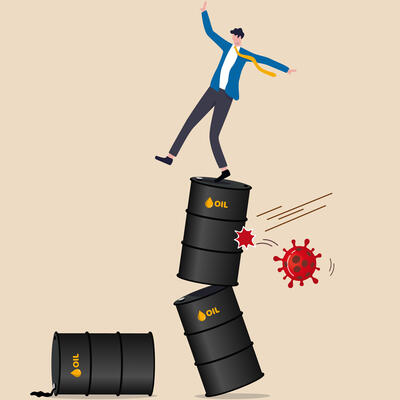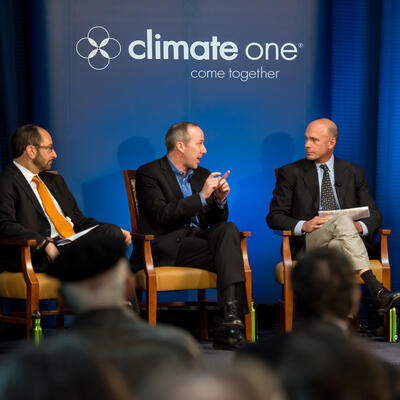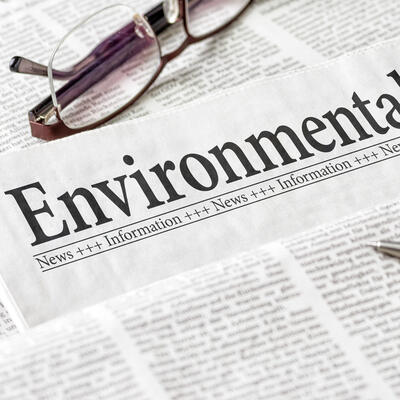
Shadows to Spotlight: Climate in the Media
Guests
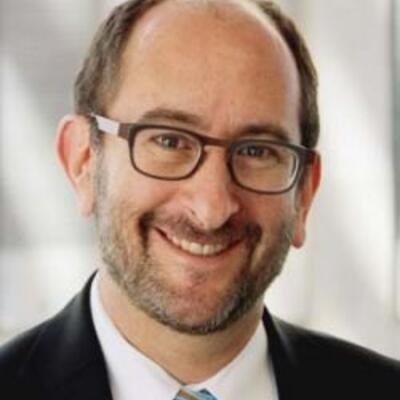
Aron Cramer
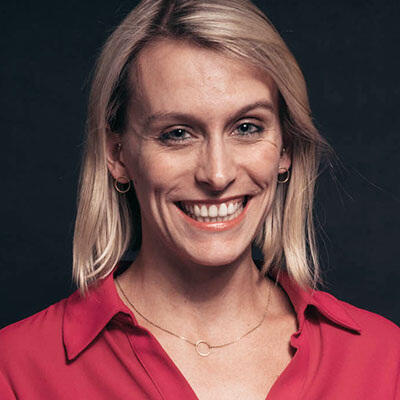
Amy Harder

Ellen Horne
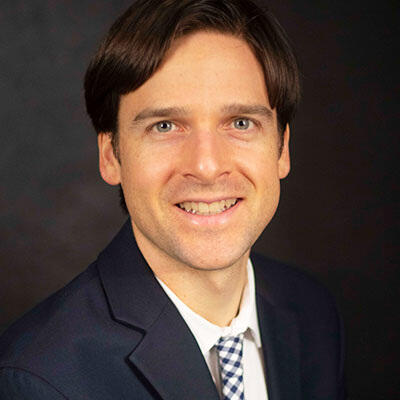
Patrick Temple-West
Summary
MSNBC host Chris Hayes tweeted in 2018 that every time he has covered climate it has been a “palpable ratings killer,” while This American Life host Ira Glass says climate change is “weirdly resistant to journalism.” So what makes climate such a hard sell for storytellers and broadcast media?
“The topic comes up, you feel this spike of anxiety, and then you just look away,” says Ellen Horne, who was Executive Producer of WNYC’s Radiolab for 12 years. “Engaging it is too challenging.”
Before moving to radio, Horne worked for the Coral Reef Alliance, and post-Radiolab she continues to produce climate-related audio stories. But in her time at the hugely popular radio show that helped launch the podcast and storytelling boom, she never figured out how to do a climate story that would meet Radiolab’s high narrative bar.
“It was the kind of story where turns out it's just not that surprising,” she says. “You think about it for a second and you're like oh I see, they're just planning for when things get warmer; that’s not that surprising.”
Nevertheless, coverage of climate change has surged since Donald Trump took office. Indeed, as climate disruption hits the economy in more ways, it is increasingly being covered as a business story.
“People say Wall Street follows the money and this is just where the money's going,” says Patrick Temple-West, who covers global energy for the Financial Times. “We want to be covering climate change as a business – who’s up who's down, who’s making money who's losing money.”
But some environmentalists bristle at this kind of hands-off coverage. They think the climate situation is so dire that journalists should lean in and help solve it. But some reporters on the climate beat say that’s not their job.
“Just like crime reporters and not vigilantes, we should not be climate advocates,” says Amy Harder, who reports on energy and climate change for Axios. “Ultimately what I think journalism is here for is present [the] facts, even if they may not fit with a certain agenda.
Parts of this episode were recorded in front of a live audience at BSR Conference 2019: The New Climate for Business.
Related Links:
Coral Reef Alliance
Radiolab
The New Climate For Business (BSR Conference)
The Harder Line (Axios)
Moral Money (The Financial Times)
Full Transcript
Greg Dalton: This is Climate One, changing the conversation about energy, the economy, and the environment.
Greg Dalton: Murder, love, and the human experience are the stuff of great stories. But climate change? Not so much.
Ellen Horne: It turns out it's just not that surprising like you think about it for a second and you're like oh I see, they're just planning for when things get warmer. That’s not that surprising.
Greg Dalton: But coverage of climate in national newspapers has surged in the Trump era.
Patrick Temple-West: We want to be covering climate change as a business. Who’s up who's down, who’s making money who's losing money.
Greg Dalton: Some people think the climate situation is so dire that journalists should lean in and help solve it.
Amy Harder: Just like crime reporters and not vigilantes we should not be climate advocates. And I think that's something that a lot of climate advocates do not understand. So I'm trying to make it clear to anybody who will listen.
Greg Dalton: Climate in the media – then and now. Up next on Climate One.
---
Greg Dalton: What makes climate change such a hard sell for storytellers? Climate One conversations feature oil companies and environmentalists, Republicans and Democrats, the exciting and the scary aspects of the climate challenge. I’m Greg Dalton.
Greg Dalton: Media coverage of climate change has increased dramatically since Donald Trump took office – and so have expectations for reporters on the climate beat.
Amy Harder: An environmentalist tweeted that, oh Axios reporter throws in the towel on climate change. And I thought, well it’s not my job to hold the towel let alone throw it anywhere.
Greg Dalton: Amy Harder reports from Washington DC on energy and climate change for Axios and writes a weekly column called Harder Line. She previously covered climate and energy at the Wall Street Journal, and believes her job is to report on carbon pollution as it is, not how advocates want it to be.
Patrick Temple-West: People say it’s just Wall Street follows the money and this is just where the money's going.
Greg Dalton: Patrick Temple-West covers global energy from New York for the Financial Times, and contributes to a column called Moral Money. As climate disruption hits the economy in more ways, it is increasingly being covered as a business story
Aron Cramer: With apologies to mainstream media, there are two tools that are holding companies accountable in ways that didn't exist to the same degree 10 years ago. Social media and the company’s employees.
Greg Dalton: Aron Cramer is CEO of BSR, a nonprofit formerly known as Business for Social Responsibility that works with companies to develop sustainable business strategies. In the second part of today’s show we’ll listen to a conversation with Aron Cramer, Amy Harder and Patrick Temple-West about media coverage of energy and climate, recorded recently at BSR’s “New Climate for Business” conference in San Jose, California.
Greg Dalton: First, why climate stories have been such a hard sell in broadcast media. MSNBC host Chris Hayes tweeted in 2018 that every time he has covered climate it has been a “palpable ratings killer.” Other prominent broadcasters also have reservations.
Ira Glass: It feels like any minute that I’m not talking about climate change it’s like I'm turning my back on the most important thing that is happening to all of us.
Greg Dalton: Ira Glass, host of This American Life, shared his climate angst on the Elephant podcast in 2015.
Ira Glass: Honestly like the brute fact of how doomed we are. It's hard to keep repeating that and have it have any feeling. Like I don’t need the exact details on the level of screwedness, like I got it.
Ellen Horne: The topic comes up, you feel the spike of anxiety, and then engaging it is too challenging.
Greg Dalton: Ellen Horne feels his pain. For 12 years she was executive producer of RadioLab, where she steered that hugely popular radio show that helped launch the podcast and storytelling boom. Ellen’s journey as a storyteller began with a mission statement she wrote for herself at the age of 24.
Ellen Horne: Like many young people I was trying to figure out how to have a fulfilling life and what to do with myself. And I had a great aunt who passed away, I’m one of seven children, and she passed away and my parents had decided to split the money that she left among the seven of us. So I think I must have inherited like $2000 and at that point in my life that was like quit your job money like it was so much money I didn't know what to do with it. So I quit my job at that point I was working for the American Arbitration Association and I was officiating union elections. And I was thinking about going to law school but I wasn't sure and so I took some frequent flyer miles I guess it was a flight coupon from a work trip where I’ve been bumped from a flight and I stayed at our friends parents, timeshare in Hawaii and I got myself this week vacation in Hawaii. And I went to the Brigham Young University Library Career Counseling Center, I wasn’t a student but they opened the doors and they welcomed me in. And I got all these career books and I took all these tasks and at the end of the week I wrote this mission statement. And the mission statement is that I want to get people excited about good ideas. And I think largely that’s still my mission statement. I think it speaks to some of just my personality characteristics and the drives that motivate me. So with that mission statement I want to get people excited about great ideas. I told everybody I knew that that was my mission statement because of course as you remember I just quit my job. And so I was looking for a job and it took a couple of months but the job that I eventually took was with a small startup nonprofit called the Coral Reef Alliance. And the Coral Reef Alliance have what I thought was a really good idea, it was to get the people who use the resource of coral reefs and appreciate it most, scuba divers and underwater photographers recreational fishermen to participate in local conservation efforts. And so with that I joined the Coral Reef Alliance and I started learning how to do membership education and growing membership do fundraising grant writing, I started going to scuba diving shows and doing these membership drives to get people to join the organization. And of course they taught me how to scuba dive I got to travel around the world and go scuba diving with rich people. It was like it was an amazing job for a 24-year-old mind blowing, right. And at some point I became aware of the threats facing coral reefs and that global warming was the greatest threat facing coral reef. And that the mission of the organization to locally protect coral reefs wasn't gonna do anything. And at that point I guess I just felt like a used car salesman. I would sit down with people to ask for their $20 annual membership or to ask for their $50,000 gift to support some local conservation effort. And I knew in my heart that it wasn't gonna do anything. And so at that point I started trying to figure out how else I could get people excited about great ideas.
Greg Dalton: And so you left that then you were at Radiolab for 12 years or so as executive producer. Did you ever pitch a climate story at Radiolab?
Ellen Horne: Constantly. So, the interest in climate never went away. We talked about it frequently and I could never figure out how to do a climate story that would meet Radiolab’s high narrative bar. At Radiolab we wanted stories to be surprising in lots of different ways. We wanted them to be surprising in terms of surprising characters. We wanted the plot to be surprising. We wanted the information that you take away from the story to be surprising. We want the story to have twists and turns there should be all these moments in the story where your understanding of the idea of the story shifts and you find yourself in some whole new different other kind of story. With all the climate stories that I would try and bring into the editorial room the characters are they were kind of predictable. They were the hard-working scientists the ice core scientist who was heartbroken or, you know, the spruce and pine researcher who was doing this one particular thing. The story never change or evolve or get somewhere that you just didn't see this next part coming which we invited in at one point some BuzzFeed reporters that kind of got close who started talking to us about the way that investors and I think it was wine industry folks who are thinking about climate change. But then it was the kind of story where turns out it's just not that surprising like you think about it for a second and you're like oh I see, they're just planning for when things get warmer. That’s not that surprising.
Greg Dalton: Birds [ph] are moving north, yeah.
Ellen Horne: Yeah, yeah.
Greg Dalton: And so do you feel like you failed at Radiolab or is it a failure of the format?
Ellen Horne: I mean I think the media is failing in general to find a way for us, I mean humanity is failing to find a way for us to talk about climate change that we can grapple with it and surprise ourselves.
Greg Dalton: Yeah, the end is always, yeah, we’re doomed we’re screwed, humanity is screwed it’s like okay we know how this ends badly for us. Let's not go there or think about it.
Ellen Horne: That's right, that's right. So the topic comes up you feel the spike of anxiety and then you just look away or you, you know, engaging it is too challenging.
Greg Dalton: Do you think the stories need to have some candy coating or entertainment to get people to swallow them?
Ellen Horne: Well, I mean I think that's a good technique that we used a lot at Radiolab. I'm not sure what the candy coating is, I mean I think that’s something I thought about a lot. How would you, what would you wrap around a climate change story to make it something that compels you to keep listening and be interested and still has a, you know, a strong takeaway. And I guess the closest that I got after I left Radiolab I went to go work for Audible for a few years and I partnered up with an author Andy Beahrs, who until recently was at Citizens’ Climate Lobby and he had written a book called Twain’s Feast. So Mark Twain, humorist, you know, an American icon. At one point he wrote while he was traveling in Europe, he wrote a menu of his favorite foods and, you know, like Twain it's totally over-the-top and hilarious. It's a list of the small little affair that he would like, you know, this meal waiting for him when he returns to America waiting at the dock when his boat pulls in and it’s a hundred items long, it’s a huge list. And he had done all this research at first when he saw the list he thought maybe this is a cookbook, you know, I could do recipes and research the history of all of these. A lot of them were Southern foods or sort of interesting items. But as he looked deeper into the list he realized that there was a thread running through of all of these wild foods from all of Twain's travels across America, many of which are you can't eat anymore. And so there's this kind of through line around conservation and land-use and the way America is changing at some point during the project. We ended up doing an audio adaptation for it and partnering up with Nick Offerman to host it. And with Nick we decided to throw a dinner party and invite some of his friends and actually cook some of these foods like raccoon, raccoon is on the list. It’s a really delightful project and there’s lot of fun there's a lot of laughter there's great immersive audio sort of a travel log and a food book. But really at the heart of it, it has a lot to say about how we're using and appreciating the physical world the natural world around us.
Greg Dalton: Slipped in there. Well, obviously Bill Nye, John Oliver done some really good work recently, try making carbon pricing funny and getting it, serving it up with some sugar and laughter. There was a moment when your daughter was seven years old and you had a gutting conversation with her. Tell me that moment.
Ellen Horne: Yeah, so very clear memory of a summer day walking home with my daughter and at seven she had started she was able to process some of the things that she's hearing in the news and she had lots of questions. And this was after Trump had made some moves to change the emissions standards out of the automotive industry. And I'm sure she heard my husband and I, you know, talking about how upsetting this was and what this meant. And so she was asking questions about it and I was trying to explain what was going on and doing it in that kind of like I want her to be interested in the world I want her to understand. I’m a pro transparency parent I always want to be telling her the truth. And so we’re having this conversation and she says something like “I hope I die before the air gets too hot to breathe.” And I just felt gutted like what am I doing with my life that I'm not spending every minute trying to change the future that she's gonna experience.
Greg Dalton: And then what happened after that?
Ellen Horne: I think I tried to say something reassuring. I mean it was like, yeah, not sure what -- I'm not sure I lived up to my own standard of being honest.
Greg Dalton: And have you talked about climate since?
Ellen Horne: We have talked about climate since. We talk about consumption habits and we talk about climate and efficiency. We're doing more composting and gardening together little things.
Greg Dalton: So age-appropriate things.
Ellen Horne: Yeah, yeah.
Greg Dalton: Do you bring up climate with your colleagues or friends when it's not a topic do you bring it up?
Ellen Horne: That's right. And we’re not often. Yeah, no I would say it's frequently a topic. I mean some of my closest friends are really actively involved in climate activism and research and still in Marine conservation. And, you know, I just did this, I did a little piece for the polls about aquaculture. I have a friend who started an investment fund for aquaculture which you know some part of that is trying to do aquaculture smarter and really apply technology in a wiser way hopefully for big impacts for climate, health, and in poverty, which I think is incredibly strategic. So yeah it comes up a lot.
Greg Dalton: And does it come up in a nihilistic way or like let’s touch that but not stay there too long kind of way because it's hard to hold for very long. I find that you know, there’s like a 30-second conversation there’s a two-minute conversation and most of them don't go beyond two minutes.
Ellen Horne: Yeah, I would say that's probably right. I would say it comes up as like these little flashpoints of anxiety every once in a while in some interesting, you know, have you heard about X, I'm interested in some little, you know, I guess I haven't had one of these conversations in a long time. But like I have a cousin who started a solar farm project. So he develops large-scale solar power projects and sometimes, you know, he's got really interesting things to say about advances there. So every once in a while we can have something that goes beyond just the sheer anxiety handwringing, but I would say largely it's far too much of the anxiety handwringing or the like, oh dear, this thing that's happened politically or internationally is a giant problem.
Greg Dalton: Yeah I wonder like what would it take for me to kind of, you know, take off the media journalism had and I don’t know go get arrested or change, you know, I’ve heard Ira Glass talk about that, you know, that if you really care about climate public media is probably not the place to do it. I wonder if you think about that seven-year-old that moment when your daughter was seven. What would it take to kind of, you know, really dive into climate beyond the constraints of the form?
Ellen Horne: And I guess I don't know that activism and getting chained up is actually the thing that's gonna change things. I think it's like we need some paradigm shift in technology and regulation. It's interesting I'm working right now with the economists at the Becker Friedman Institute on a podcast series. And one of the things we’re talking about is the way that China has changed and how nobody really thought it was possible. And economists are kind of still dropping their jaws over how their economic development has happened. And apparently there is a giant energy change of foot that in China the leadership has decided that the air quality there's too many people dying and the air quality is too poor and that they are going to become much cleaner, faster. And I'm holding my breath a little bit to see what happens there and God I'm hoping to be surprised, you know, I'm hoping something wonderful happens.
Greg Dalton: Well the survival of the regime is challenged if the new middle class feels threatened. So it's self-preservation on part of the ruling regime there because they don't want the urban middle-class who’s now empowered and wealthy to revolt because their kids are choking. So they have a motivation. And hope that plays out. Well thanks for sharing your story and your insights from Radiolab and your family, Ellen Horne, appreciate it.
Ellen Horne: Yeah, my pleasure. I appreciate the chance to talk about it. It's given me a lot to think about.
---
Greg Dalton: Longtime RadioLab executive producer Ellen Horne on the difficulty of telling climate stories that surprise us. You’re listening to Climate One. Coming up, covering the business of climate in all its gory detail.
Aron Cramer: Cheerleading is not journalism and I think we as a community actually do ourselves a disservice if we make it seem far easier than it is, if we suggest that everything is about win-win solutions because the world is a lot messier than that.
Greg Dalton: That’s up next, when Climate One continues.
---
Greg Dalton: This is Climate One. I’m Greg Dalton, and we turn now to a conversation about current media coverage recorded recently at BSR’s “New Climate for Business” conference in San Jose, California. My guests were Aron Cramer, CEO of BSR; Patrick Temple-West, a global energy reporter for the Financial Times; and Amy Harder, who writes for Axios on the transition of fossil fuel industry and growing global demand for energy. We begin with Amy describing how she balances the facts of climate change with the urgency of what those facts are saying.
Amy Harder: One of the interesting things about my job is that, there's a lot of people out there on Twitter but also in the real world as well who think that it’s my job as a journalist to say where we should be going to address climate change as supposed to where we actually are going in this world. And that's one of the key issues that are in a debate around the International Energy Agency forecasts for Global Energy demand and emissions. And so I often, you now, I did a column earlier this year and the headline was something like it's getting too hard and too divisive to solve climate change. And I just laid out some really obvious, but very stark facts like the world has never reduced greenhouse gas emission except for briefly during economic crises. And I don't think that's a way any of us want to actually reduce emissions. And I had a whole other series of facts in there as well. Just laying out in very big picture terms how this is getting very, very, difficult. And somebody an environmentalist tweeted that, oh Axios reporter throws in the towel on climate change. And I thought, well it’s not my job to hold the towel let alone throw it anywhere. And so I present these facts which include the fact that we are not anywhere near on the target to address climate change, even if it doesn't get as many retweets or likes. And I’m okay with that because ultimately what I think journalism is here for is present those facts even if they may not fit with a certain agenda.
Greg Dalton: Right. And we’ll get into that a little later about the psychology. I think there's a lot of sort of wishful thinking or what some people call motivated cognition. People sort of believe things that they want to be true. Aron Cramer, I think that happens a fair amount in the sustainability press there's a lot of people sort of writing things as they want it to be rather than it is. Was that fair?
Aron Cramer: I think it is fair. I think cheerleading is not journalism and it's important to state a point of view, it's important I think to say this is where we need to go, but I think we as a community actually working on sustainable business actually do ourselves a disservice if we make it seem far easier than it is. If we suggest that everything is about win-win solutions because the world is a lot messier than that. So I think having the point of view about the direction of travel is crucial. That's why we're here. That's what we get up to do every day, but also being realistic about how far we've come is essential to maintaining credibility and if you're not credible you don't motivate. So I think being grounded in the reality of where we are is very important.
Greg Dalton: Although I think underneath the climate conversation there's a lot of anxiety and pain and people just kind of want to believe that we’re making progress even if we’re not making progress I just want to believe that today because I want to think that my work is having an impact, right. Kind of wishful thinking underneath there. Patrick Temple-West, most economists would say that pollution is a classic market failure problem because few people or institutions pay the full price of the pollution that they put into the air or the water it’s a market failure says. Writing for the Financial Times, which is the global paper for global capitalist, how do you think about this story as a market failure story?
Patrick Temple-West: We were covering climate change ESG and sustainability as a business sector. I have colleagues who cover banking who cover energy we want to be covering climate change as a business. Who’s up, who's down, who’s making money who's losing money. And there are a lot of different ways into the climate change story, you can go to Greenland and report about how the ice sheets are melting faster than they used to be as one of my colleagues from London did or you can cover things like task force for climate related disclosures. We've written stories about that. We've also covered proxy advisors and some of the pending SEC regulations for those as they are recommending shareholder votes for companies in climate related disclosures. So there are different ways into the story and that's how we've been thinking about it at the FT.
Greg Dalton: And is that story a risk story or an opportunity story?
Patrick Temple-West: Both. And something that we want to be talking to is investors who say, look, climate change is coming what are the opportunities for us. Where can we talk to meteorologists climate scientists and say, you know, Columbia sportswear if it's not too cold out then they won’t be selling as many coats. Well, who are the investors who are saying, no, we believe this winter might actually be colder than normal and we’re gonna be buying Columbia sportswear samples like that.
Greg Dalton: Amy Harder, you on sort of the risk opportunity balance I think most people think of climate as a risk because it’s been in a very doom and gloom dark frame. So how do you think about the opportunity risk balance?
Amy Harder: I think this is something that I have been covering a lot this year. One of my first columns in this year was covering the United Nations climate conference which is held at the end of each year. And I remember a negotiator for Saudi Arabia said the following and I’m paraphrasing. He was saying, “You know, if you think about it we in Saudi Arabia are actually the most at risk due to climate change.” And I think that kind of stunned some people, you know, from low-lying nations that won’t exist in 50 years to hear that from a country like Saudi Arabia. But if you listen to what he said he actually made some sense in that Saudi Arabia is a desert nation so will be exacerbated with droughts. And in addition action on climate change will erode the economic base of Saudi Arabia which is the whole purpose of their IPO. Now, putting morality aside and the blame that people want to place on climate change it’s true that Saudi Arabia will be very on the losing end of both climate change itself and the actions to address climate change. And so it's a risk-risk for Saudi Arabia. Now to be clear, the impacts of climate change are on net very negative. But there will be some short term positives and if that short term positive happens in a place like Russia where they get greater agriculture yields for a certain number of decades and that won’t be forever, but it will be for a certain amount of time, that’s gonna be an opportunity. And so there’s this idea that because we all share one planet we all need to be in it together I think is a little bit naïve. I actually think again putting on my sort of journalist hat and not telling people what they want to hear but what is actually the case, I actually think climate change will divide the planet further because the policies will hit different countries the hardest and the impact of a warming planet will hit different parts of the world differently. And so that's why this is such a tough issue because with a lot of things for example, like smoking and the big fight of the tobacco companies, you know, smoking is a bad habit that some people engage in that’s not good for your health. So the foundation of the global economy and has repercussions around the entire world. And so, you know, I think is one of the reasons why I love covering this issue because it is so complicated and so nuanced. I was talking recently with an economist at the University of Chicago former Obama administration official Michael Greenstone. He and I got into this interesting conversation about morality versus economics so kind of going up your question that you asked Patrick. And, you know, in the light of this talk about Greta Thunberg, you know, sailing across the Atlantic and all those things, you know, this idea of morality is really sticky because as soon as you start talking about morality, you need to accept the fact that my morals are not your morals. And then where does that leave you. And so then he as any good economist would say you need to make it about the money. And that's why he keeps banging the drum of a carbon tax and maybe we’ll talk about that in a minute if you want. But nonetheless I tend to think that even though climate change brings up a lot of moralistic and altruistic thoughts that ultimately it's going have to be about money.
Greg Dalton: If you're just joining us we're talking about climate change and energy covered with Amy Harder from Axios. Aron Cramer CEO of BSR. And Patrick Temple-West from the Financial Times. I'm Greg Dalton. Climate stories in the five major national papers have increased in recent years the New York Times has surged from about 100 articles a month during the Obama years to 300 or as many as 500 articles a month recently. Citations in the Washington Post in Los Angeles Times registered similar increases and publish around 50 to 100 articles a month. The Wall Street Journal and USA Today publish far fewer articles and have not increased coverage nearly as much in the last decades. So we basically have three tiers here in the five major national newspapers. The Times pulling ahead the Los Angeles Times and Washington Post kind of a middle band. Wall Street Journal and USA Today down there at the bottom. Amy Harder, what do you make of that you used to work at the Journal?
Amy Harder: Yeah, I can definitely say that the Journal is doing a lot more covers on climate change since I left, that’s a correlation, not a causation. I can’t overstate how much change has happened in the world since I left the Journal. And so for me it's a little bit hard to know well is it because I left the Journal or is it because Trump became president. Probably more that Trump became president. When I was there at the Journal there was never any censoring of my coverage of climate change and that’s something I’ve said publicly and will continue to. However, there was also not a lot of encouragement to cover climate change there. However, earlier this year and I think also last year the Journal did a great series on the financial aspects of climate change. But they don’t cover climate change they don’t have a climate change team like the New York Times does and continues to grow. So I think that is indicative of this idea that the financial institutions are just slower to embrace climate change compared to sort of the politics and the activism side of things. And so I anticipate that the Journal and, you know, of course the FT has been great at covering more climate change than the Journal I would say. I think as institutions I mean just in the last couple of weeks we saw the Federal Reserve held a conference on climate change which I think is pretty striking given President Trump remains in office. I think as you see the concern among financial institutions pick up you will see it grow in publications like the Journal. Now if you read the comment section of these Journal articles which I sometimes do for entertainment purposes. There are still a ton of deniers in there who are wondering why the heck are you covering this issue. But I think it's great that the Journal is doing it. And one niche area that I've sort of carved it out for myself because I don't think there's a lot of coverage in there aside from the great coverage of the FT of course, is this area between what the oil and gas companies are doing in the climate change space because there’s a ton of climate change coverage like what the New York Times is doing. There’s a ton of coverage of oil and gas but there’s not the overlap of that. And I tend to think that's a really critical area and it’s one of the reasons why I cover it and hopefully more will as well.
Greg Dalton: Patrick Temple-West, are there ever push back at the Financial Times about why are we doing this or it's not happening among the sort of global corporations your audience?
Patrick Temple-West: All the time.
Greg Dalton: Really?
Patrick Temple-West: A lot of people see this as marketing. ESG and sustainability are just putting this green bond out there for debt that you would've issued anyway. And yeah people say this is something that it’s just Wall Street follows the money and this is just where the money's going. So we do have a mandate to cover greenwashing if there's examples of it. We will call it out and we’ve done some stories on that front. But yeah it’s institutional and it's political in Washington. I remember covering some climate change hearing from earlier this year and you'll see from the Republicans they’ll hold up these articles from 1980 saying global cooling are gonna be hitting a deep-freeze in the next decade or so. So they will say, well science is uncertain, why do we care about this?
Greg Dalton: Amy Harder, you wrote recently about the U.S. Chamber of Commerce long opposed to any change on fossil fuels. They have changed some of their language and now say, inaction is not an option. Is that change language or is that change policy and behavior of the U.S. Chamber huge player?
Amy Harder: Right. So the U.S. Chamber of Commerce to me really represents the lowest common denominator in corporate America because they have to satisfy so many diverse members. I would say for now it's more talk a lot more talking a lot less actual action. But nonetheless in Washington words matter more than perhaps some other places. And the chamber has done a striking shift, you know, even going back to 2009 they had an official there who wanted to hold a public trial on climate change science really challenging the mainstream scientific consensus. Of course fast-forward to 2017 they helped fund a study that bashed Obama’s commitment to the Paris climate agreement a study that was eventually called out by President Trump when he pulled out of the deal. Fast forward to two more years and we are here present day the chamber not only supports the climate deal but is also holding climate workshops which are close to the press which hopefully mean something more is being done than just talking. And so I think, you know, it’s a slow evolution in there and that it’s something that I always point out. Do I call it greenwashing? I probably don’t but nonetheless I point out that for now doesn't mean that they're changing support for certain policies. For now the main policies that the chamber supports and most Republicans in Congress is this idea that they support R&D for new technologies. And that’s a really safe space politically to be in. The chamber does support an increase in the gasoline tax to fund infrastructure. So I don't think it's outside the realm of possibility that someday the chamber could support a carbon tax. The fact that they are now supporting the Paris climate agreement was something that they tried to sort of brush under the rug over the last six months. And I'm glad that they’re owning up to it on their website and we’ll see, you know, over the next several months there’s companies that tell me that if the chamber doesn't step up to the plate more that they might leave the chamber. And we’re seeing that in some other trade associations and we’ll see if there reaches a critical mass where this opposition to big climate policy falls down and then there’ll be sort of a pathway for something big to happen.
Greg Dalton: PG&E, Pacific Gas and Electric 10 years ago left the U.S. Chamber over climate change, long forgotten. But Aron Cramer, it's interesting that the U.S. Chamber is inching toward climate action at a time when we have an administration that is moving in the other direction. How much is the Trump administration shaping the business behavior we’re in this big era of deregulation.
Aron Cramer: The last part of your question I think is a really interesting part. I think that people have conflated climate action with which many people support polls suggest the number of people as well as business leaders, investors, others support more and more by the day with a lot of regulation which a lot of companies don't like as just as a matter of course. And those two things have well, I won't put it in the past voice but in active voice. There are lot of interests in Washington that have actively worked to conflate those two things so that you bring along people who may be neutral on climate change to oppose climate action because it’s seen as a proxy for an overactive regulatory state. And I think that's part of the reason why we've seen so much gridlock in Washington. The other thing about the U.S. Chamber is the big companies are basically more progressive than a lot of small companies in America around climate change because smaller companies are very worried about more regulation which raises their costs. And the U.S. Chamber has a lot of small medium enterprises inside it so that dynamic is there. You know, with respect to the Trump administration to try to figure out why it takes the position that it does. I honestly, I’m at a loss. I think, you know, the business community is clear about what it wants, states and cities are clear about what they want, investors are clear about what they want 197 countries around the world are clear about what they want. The Trump administration has so isolated itself on this and other issues as well that it's hard to come up with a rational argument for that position. Clearly there are some business leaders who are very pleased, you know, not least the coal industry but let's remember the coal industry employs fewer people than Arby's does in America. So it's not clear to me why defending jobs in the coal industry should become such an important point.
---
Greg Dalton: You're listening to a conversation about climate in the media. This is Climate One. Coming up, more from the frontlines of reporting on the business of climate.
Amy Harder: Frankly Trump is creating this big space on the right. So that corporations are somehow becoming the most reasonable people in the room, with all due respect to the corporate executives in this room.
Greg Dalton: That’s up next, when Climate One continues.
---
Greg Dalton: This is Climate One. I’m Greg Dalton. We’re talking about the new business of climate journalism, recorded recently at the BSR conference in San Jose, with Amy Harder, who covers energy and climate for Axios; Patrick Temple-West, a global energy reporter for the Financial Times; and Aron Cramer, CEO of BSR. Amy describes the prospects for some kind of climate deal coming together in Congress.
Amy Harder: I would say I'm looking at two potential paths. One is well I supposed three potential paths. One being nothing happens in status quo. Another is the one you're talking about, which is, you know, either Trump wins reelection or Democrats wins and there's this, opening for a sort of a moderate, bipartisan approach which is be some sort of carbon tax the backers like to call it a fee/dividend where the money is returned to consumers. I think that has a lot of support from big oil companies and a lot of other corporations. If you talk to them those backers a carbon fee, carbon price is inevitable. But when I talk to Republicans staff was on the hill they say it’s impossible. And so trying to find the middle ground in there is always a fun challenge as a reporter. I do think the carbon dividend approach could end up backfiring because it is so prescriptive. They’re not letting the lawmakers on the hill craft it how they want to craft it. And I did a column earlier this year about how the biggest fight over what to do with the carbon taxes what to do with the money. And so I think there's a whole another sort of tangential coalition of corporations, and they're just telling Congress we want a carbon price. However you want to put it together we’re fine. So in general, there’s this middle ground where your bipartisan support somehow Republicans enough Republicans come around to the idea and to be clear right now we have one member of Congress who’s not retiring who supports a carbon tax, one Republican member of Congress. So it’s a long way to go. But the other path, the third path was actually I think is slightly more likely than the middle path which is that if a Democrat wins, they will try to push something that’s far more aggressive too aggressive and will not pass Congress. And we’ll have all these corporations that had been sort of inching to the middle, because frankly Trump is creating his, you know, creating this big space on the right. So that corporations are somehow becoming the most reasonable people in the room. But that’s, you know, the world that we’re living in under Trump. And so this third path, is one where all the political players run back to their corners and nothing gets done because the Overton window, so to speak has moved so far to the left that nothing happens. So two paths nothing happens, and one path something happen. So those are the paths I see.
Greg Dalton: That Overton window, yeah, but socially acceptable. We’re gonna go to our lightning round. I’m gonna ask, just mention a noun or phrase and ask you for your first response. First thing that come to your mind completely unfiltered from your subconscious. Amy, let’s see, first thing that comes to mind. Amy Harder, flight shaming? One phrase. One word, one phrase. What’s come to your mind?
Amy Harder: Mostly irrelevant.
Greg Dalton: Patrick Temple-West, carbon offsets?
Patrick Temple-West: Market opportunity.
Greg Dalton: Aron Cramer, corporate sustainability reports?
Aron Cramer: Improve them now.
Greg Dalton: Patrick Temple-West. Bloomberg new energy finance?
Patrick Temple-West: Energy finance, a competitor.
Greg Dalton: Amy Harder, an energy reporter, you delight in scooping?
Amy Harder: Jen Dlouhy at Bloomberg because she does great work. She’s been all over the RFS and a bunch of regulatory things.
Greg Dalton: Patrick Temple-West. The leader you most want to interview?
Patrick Temple-West: Putin.
Greg Dalton: Amy Harder. The big get you covet most? Big get, so interview or big get?
Amy Harder: Something that I've already done or something that I want?
Greg Dalton: No. That you want.
Amy Harder: I think the Vatican is doing a lot of interesting things on climate change. So I would love to interview the Pope.
Greg Dalton: Both aiming high. Putin and the Pope, okay.
Amy Harder: We can interview them together on stage.
Greg Dalton: Last one for Aron Cramer. A company that you would not accept sponsorship from because their values conflict with BSR?
Aron Cramer: That is a very good question.
Greg Dalton: The soft answer is a category.
Aron Cramer: A category. Well, the Misk Foundation, which is run by Mohammed bin Salman would not be one that I would be interested in.
Greg Dalton: There we go. Let’s give them a round of applause for getting through the lightning round.
[Applause]
Public attitudes about climate change are more nuanced than acceptance or denial to those often seen as binary, you accept or you deny. Yale and George Mason University has been serving Americans for several years and breaking their attitudes into six categories from alarmed, concerned, cautious, disengaged, doubtful and dismissive. Nearly 60% of Americans are alarmed or concerned that’s up significantly from just four years ago. Amy Harder, when you look at this what does that say to you in terms of dismissive, you know, I think that 9% of people who are dismissive 60% are alarmed or concerned. Does that dismissive or denial voice have an amplified presence in the media?
Amy Harder: Oh certainly. And that's not to blame the media but it's a reflection of where the political debate is in Washington DC. So eight years under the Obama administration I very rarely called up for example, Myron Ebell, who is a top official at this conservative think tank called the Competitive Enterprise Institute. He would probably fit into the dismissive or doubtful category. But he was now an advisor of the Trump transition team and I talked to him on a semi regular basis. And so with and a president in the White House who doesn't acknowledge climate change and is getting information from people like Myron Ebell, I inevitably have to talk to them sometimes. Now, that isn't to say I quote what they say about climate change, I don't but they’re nonetheless players in this world and that’s the reality that we’re operating in. So I do think it would be interesting to sort of compare these circles and sizes to the influence they have. Because it’s not just Myron Ebell it’s the Wall Street Journal editorial page which to be clear is separate from the news side, it’s Fox News and those are really making the two 9% percents there far more greater influence than the 29 and 30%. I’m actually a little bit surprised that there’s 29% of people that are alarmed. I think when I listen and on focus groups for example, I hear a lot of people are concerned, very few that would be so alarmed that they would take an additional $10 on their electricity bill. There’s this one woman I talked to a voter in Iowa and she’s concerned about climate change for her children but she would not support a $10 increase on her electricity bill. And I ask why not, she’s like I’m a single mom of four, I pay what I can. I think the corporations should pay. And so I think that even though I would be surprised if there's 30 if you ask those 30% of people would you support X increase in your electricity bill and gasoline bill. The answer is probably not and so that’s the disconnect that I see. And then you pair that with the outsize influence of the people who dismissed the scientific consensus of climate change and you have a really, really difficult, you know, public engagements platform.
Patrick Temple-West: And that's exactly what happened in France earlier this year too with the Gilet jaune protest.
Greg Dalton: Patrick Temple-West there's a lot of stories that are done because they’re highly relatable. They may not necessarily relate to big carbon reductions so I’m thinking about straws and cups. Perhaps straws is something to get written about perhaps too much they come in really fast. You've written about straws and cups. Tell us about that story.
Patrick Temple-West: Well, they are important for the consumer brands, Starbucks, McDonald's that are producing these things and it is a cost for those companies. They are trying to produce more sustainable eco-friendly products. I think we were covering those as from those companies’ perspectives. And yes people it is a relatable way into the climate conversation everybody who gets a Starbucks, McDonald's cup, who is using those as we've seen with the Trump advertisements on plastic straws. They do have a visceral impact for people so we’ve been looking at that as a part of a business segment for those firms.
Greg Dalton: Aron Cramer, sometimes there is tension between villainization and accountability in the press, right. There's some things that environmentalists often the business model is to villainize an individual or an institution. So talk about how companies can be held accountable without villainizing them.
Aron Cramer: Well, I mean what's really interesting also is I've been in a variety of contexts as my context as my colleagues at BSR where we’ll sort of inherit a public dispute between an NGO that is really challenging what a company is doing and a company that's really pushing back and publicly it's a dialogue to the death. And then you get people in a room and actually you can build an understanding and real progress we see that all the time. And so there is something about the public dialogue that pushes people to the ends of the spectrum, which may have some benefit at times, but more often it prevents real progress in the synthesis of the different ideas that a company and an NGO may have. So I and I think my colleagues at BSR we’re more interested in figuring out how we can synthesize those perspectives companies can learn from what NGOs see because often NGOs see the world in a way that a company doesn't and should. And equally the company will understand how to make progress and how to make it real and also credible in ways that sometimes NGOs don't have the capacity to do. So that's why we’re here and I think the accountability is important, you know, journalism is crucially important we’ve seen nothing but hugely consequential journalism on a whole range of subjects over the last three years in particular in the United States and the public dialogue sometimes distorts things in ways that are not useful.
Greg Dalton: Well, and social media distorts too. Because you don’t build a big social media following by having nuanced the middle of the ground understanding. You build social media following by being bombastic at attacking and villainizing and that grows but it creates that rift that then BSR comes in and fills. Which gets to the sort of the revenue models, Amy Harder, for media organizations. Few years ago newspapers, well, on the door of death a lot of them they think since the election they’ve had some growth in subscription. What’s Axios’ business model and are you incentivized to write stories to drive more ads to do clickbait?
Amy Harder: To answer your second question first is definitely not. My editors give me complete freedom to write about whatever I want to write about. They obviously trust me that I’ll write about smart things. But never once have they brought up traffic numbers of my columns in any other stories I write. In fact, I was the one who went to my editors to ask, hey, can I get the metrics from my columns because I actually don’t get it otherwise. And I get it a week after it publishes it so it teaches me to have patience. And I really don't stress about this in my coverage but Axios is advertising based now. In the next year we do hope to have a high-end subscription model which we’ve talked about in the media press. So yeah, so it’s really exciting and I just love that my editors let me do that.
Greg Dalton: We have some questions from Twitter. Is there a certain beat or niche of climate coverage that you don't see being covered right now that you would like to read about? Patrick Temple-West.
Patrick Temple-West: Carbon credits. California is a great example of this, the price for the California carbon credit for transportation has hit record highs for two months in a row. And it’s driving, it's making more economically feasible. The price for biofuel renewable energy projects that when the credit price is lower were not getting funded. So I think that's a market, Oregon is doing similar program to that, Colorado, New York are looking at similar models. So think it’s natural need for us to be covering.
Greg Dalton: One more from Twitter. Amy Harder, how would you hope the climate narrative and mainstream media will evolve over the next five years?
Amy Harder: So I’d like to differentiate between print, online or newspaper and TV. And given most people get their news from TV, I do hope that TV journalism gets a little bit more nuanced and I know that's just a lost cause probably. But I do hope that there's a little bit more room for nuanced coverage in TV journalism that's not just, you know, I think there's still some outlets that puts people who don’t acknowledge climate change on their TV. So I do hope that can be a little bit more deeper on the TV side of things.
Greg Dalton: Other question for the journalists. How do you balance between advocacy and journalism? Is there a place for giving space and voice to perspectives not based in fact? Amy Harder, you’re a straight newsperson you're in the fact world but what about the --
Amy Harder: Yeah. Well, I’m not if you mean not based in facts, if you mean, you know, rejecting the mainstream science on climate change then the answer is no. For example I did a story right when Trump was tweeting about climate change a lot. My editors wanted me to just tell the world who are these people that are giving Trump this information. It’s not that many people, it's mostly older white men in Washington DC which I don’t know if there’s a correlation, but nonetheless that's who it is. And I reached out to these people for comment but I didn't allow them to say something that isn’t factually accurate. But nonetheless I did reach out to them. So if that’s what this question means, then we don't in terms of, you know, voices to people concerned about climate change, you know, poor people in developed countries I mean obviously yes. I think that's something that we should cover more. I personally don't given my beat is in Washington DC but I do see that more and more. But I do think it's important that journalists are not advocates for climate change, just like crime reporters and not vigilantes we should not be climate advocates. And I think that's something that a lot of climate advocates do not understand. So I'm trying to make it clear to anybody who will listen.
Greg Dalton: You’ve been listening to a Climate One conversation about climate change in the media with Amy Harder, energy and climate reporter for Axios; Patrick Temple-West, who covers environmental, social and governance issues for the Financial Times; and Aron Cramer, CEO of Business for Social Responsibility. Special thanks to the incredible team at BSR for including us at their conference and partnering with us for this episode.
Greg Dalton: To hear more Climate One conversations, subscribe to our podcast at our website: climateone.org or wherever you get your pods. We’ve been nominated for “Best Green Podcast” at the i-Heart Radio Podcast awards presented in Los Angeles in January. That’s super cool. We want to thank you for your support and i-Heart Radio. Keep writing those reviews, they really do help.
Greg Dalton: A quick reminder that as a non-profit, we rely on the generosity of individuals like you to produce these podcasts each week. We hope you’ll consider making a donation to support Climate One, which will be matched up to $15,000, at climate-one-dot-org-slash-donate.
Greg Dalton: Kelli Pennington directs our audience engagement. Tyler Reed is our producer. Sara-Katherine Coxon is the strategy and content manager. The audio engineers are Mark Kirchner, Justin Norton, and Arnav Gupta. Devon Strolovitch edited the program. Dr. Gloria Duffy is CEO of The Commonwealth Club of California, where our program originates. [pause] I’m Greg Dalton.
